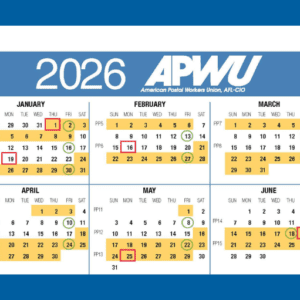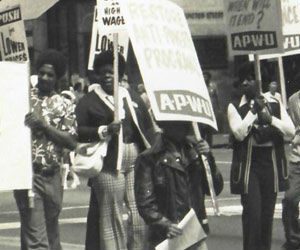March 1, 2016
Facing Our Future Head On
(This article first appeared in the March-April 2016 issue of The American Postal Worker magazine.)
In addition to fighting for a good, fair, workable contract, there are a number of issues facing us.
- The threat of Area Mail Processing (AMP) consolidation still looms large.
- We are still fighting to get Congress to support legislation that would reverse the reduction in service standards.
- The fabricated pre-funding requirement, which chokes the Postal Service financially, is still a legal requirement.
- It is necessary for us to understand, support, and promote postal banking.
- We’re still supporting the Stop Staples campaign, which is the tip of the iceberg and could lead to our eventual demise.
It sounds overwhelming. Well, it can be, but we are as strong as our numbers are large. In unity we are up to the task and we must bring every member along with us. Every member is a part of this great union and every member must be engaged. Contributions big or small are vital to our survival and progress. Our strength is in our numbers.
Last year ended without a negotiated contract, but we will get a contract with your support and our collective determination. It will likely improve our general interests.
Excessing, Assignments, Staffing
We faced our first Article 12 Area move date for 2016 in February. Area move dates cannot occur more than once in any three calendar-month period except by mutual agreement.
In October, the parties agreed to extend the Memorandum of Understanding Minimizing Excessing, which retains the 50-mile radius restriction on excessing until May 20, 2018.
The APWU position is clear: If management plans to go forward with Article 12 reassignments, the Postal Service must provide updated documentation based on current conditions and the requirements of the EL-408 Handbook. The old, stale, inaccurate reports the USPS generated two or three years ago to justify consolidations then cannot be relied on now to further management’s agenda and the destruction of a fully functioning Postal Service.
We have experienced growth in the career craft complement, with 25,000 Postal Support Employees (PSEs) converted to career and a lull in voluntary reassignments. However, we cannot let our guard down on staffing issues.
During this time we must remain attentive and hold the Postal Service accountable at every opportunity. Despite our efforts to get Republicans and Democrats to support legislation to restore delivery standards, Congress failed to act on any meaningful legislation in 2015. Not enough of us heeded the call to contact our representatives to push for action.
Your Work Life in the Crosshairs
Do you realize how your everyday work life is connected to delivery standards? Changes in retail hours, which affect your reporting times, scheduled days off, vacations, staffing, bids, routes, and assignments, are directly related to collections and delivery standards.
There are times when I feel the USPS is determined to self-destruct and the union is the only thing standing in its way. What do postal managers think will happen to them? Who would hire them after they ruin the longest-running, most highly favored national service in the country? We are a “service.” Sorry, I digress. This year we must renew our efforts to restore delivery standards that not only will improve mail service, but improve your work life and home life as well.
Effective Labor-Management Meetings
Labor-management meetings are an avenue available to locals, per the Collective Bargaining Agreement (CBA), to address unresolved issues. They can be an effective tool.
A lot of locals have language in their local agreements that outline when and how these meetings are held. The CBA states the APWU is entitled to these meetings at the local and regional level and at such other intermediate levels as may be appropriate.
The union is an equal participant in these meetings. Management cannot dictate the terms or the process. The meetings can be used to resolve local issues and get information. In addition, when local labor management meetings don’t resolve issues, meetings can and should be scheduled on a district level. Several districts now have regularly scheduled meetings, usually once per quarter.
If you work in an office where management’s attitude is, “It’s my way or the highway,” you can use district labor-management meetings to bring issues to light, voice concerns, and correct problems. My fellow regional coordinators, Omar Gonzalez, John Dirzius, Mike Gallagher, Kennith Beasley, and I are always available to provide assistance.
Get Involved, Get to Know Your Union
All employees should know who their union representatives are and how to reach them. Every employee should be a member. If information on local meetings and officers is not posted on a union bulletin board or somewhere in your office, make an effort to learn when and where meetings are held, who the officers are, how to reach them, and how you can be an active participant.
Most of us don’t think about the union until we need representation. There is no substitute for knowing your rights and knowing who enforces them.
You don’t have to be an elected officer or steward to contribute. Help with one event, join a committee, be a positive voice on the workroom floor, and/or participate in a campaign for the betterment of all working-class people. There are countless examples of how abuse and mismanagement can be abated when we work together.
Mark Twain said, “If you do what you’ve always done, you’ll get what you’ve always got.” Building a stronger and more active union is our goal. Buy into it!



